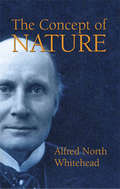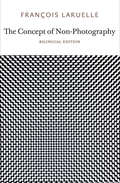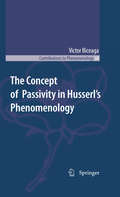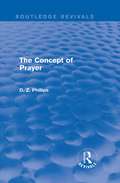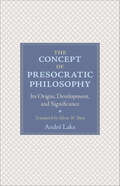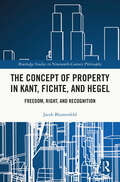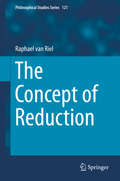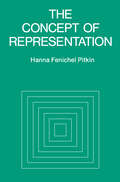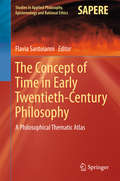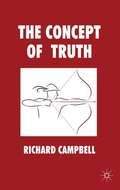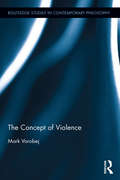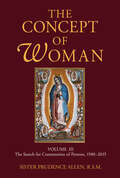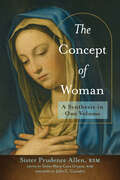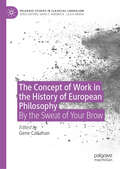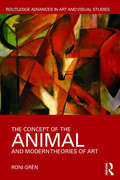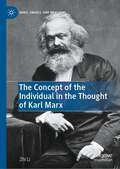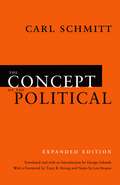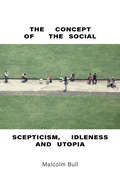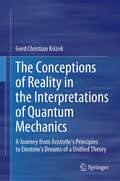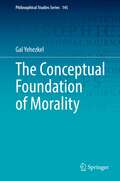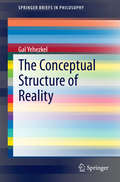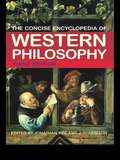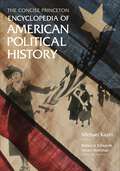- Table View
- List View
The Concept of Nature
by Alfred North Whitehead"One of the most valuable books on the relation of philosophy and science which has appeared for many years. " -- "The Cambridge Review"<P><P> "A great contribution to Natur-philosophie, far the finest contribution... made by any one man. -- "Mind"<P> In addition to his brilliant achievements in theoretical mathematics, Alfred North Whitehead exercised an extensive knowledge of philosophy and literature that informs and elevates all of his works. This book represents one of his most significant achievements in the field of natural philosophy. "The Concept of Nature "originated with Whitehead's Tarner Lectures, and it offers undergraduate students and other readers an absorbing exploration of the fundamental problems of substance, space, and time. Whitehead's discussions are highlighted by a criticism of Einstein's method of interpreting results, and by his alternative development of the celebrated theory of the four-dimensional space-time manifold.
The Concept of Nature: The Tarner Lectures Delivered In Trinity College, November 1919 (classic Reprint)
by Alfred North WhiteheadIn addition to his brilliant achievements in theoretical mathematics, Alfred North Whitehead exercised an extensive knowledge of philosophy and literature that informs and elevates all of his works. This book represents one of his most significant achievements in the field of natural philosophy. The Concept of Nature originated with Whitehead's Tarner Lectures, and it offers undergraduate students and other readers an absorbing exploration of the fundamental problems of substance, space, and time.Whitehead's discussions are highlighted by a criticism of Einstein's method of interpreting results, and by his alternative development of the celebrated theory of the four-dimensional space-time manifold.
The Concept of Non-Photography: Bilingual
by Francois LaruelleA rigorous new thinking of the photograph in its relation to science, philosophy, and art, so as to discover an essence of photography that precedes its historical, technological, and aesthetic conditions. If philosophy has always understood its relation to the world according to the model of the instantaneous flash of a photographic shot, how can there be a “philosophy of photography” that is not viciously self-reflexive? Challenging the assumptions made by any theory of photography that leaves its own “onto-photo-logical” conditions uninterrogated, Laruelle thinks the photograph non-philosophically, so as to discover an essence of photography that precedes its historical, technological and aesthetic conditions. The Concept of Non-Photography develops a rigorous new thinking of the photograph in its relation to science, philosophy, and art, and introduces the reader to all of the key concepts of Laruelle's “non-philosophy.”
The Concept of Passivity in Husserl's Phenomenology
by Victor BiceagaBuilding upon Husserl's challenge to oppositions such as those between form and content and between constituting and constituted, The Concept of Passivity in Husserl's Phenomenology construes activity and passivity not as reciprocally exclusive terms but as mutually dependent moments of acts of consciousness. The book outlines the contribution of passivity to the constitution of phenomena as diverse as temporal syntheses, perceptual associations, memory fulfillment and cross-cultural communication. The detailed study of the phenomena of affection, forgetting, habitus and translation sets out a distinction between three meanings of passivity: receptivity, sedimentation or inactuality and alienation. Husserl's texts are interpreted as defending the idea that cultural crises are not brought to a close by replacing passivity with activity but by having more of both.
The Concept of Prayer (Routledge Revivals)
by D. Z. PhillipsMany contemporary philosophers assume that, before one can discuss prayer, the question of whether there is a God or not must be settled. In this title, first published in 1965, D. Z. Phillips argues that to understand prayer is to understand what is meant by the reality of God. Beginning by placing the problem of prayer within a philosophical context, Phillips goes on to discuss such topics as prayer and the concept of talking, prayer and dependence, superstition and the concept of community. This is a fascinating reissue that will be of particular value to students with an interest in the philosophy of religion, prayer and religious studies more generally.
The Concept of Presocratic Philosophy: Its Origin, Development, and Significance
by André LaksWhen we talk about Presocratic philosophy, we are speaking about the origins of Greek philosophy and Western rationality itself. But what exactly does it mean to talk about “Presocratic philosophy” in the first place? How did early Greek thinkers come to be considered collectively as Presocratic philosophers? In this brief book, André Laks provides a history of the influential idea of Presocratic philosophy, tracing its historical and philosophical significance and consequences, from its ancient antecedents to its full crystallization in the modern period and its continuing effects today.Laks examines ancient Greek and Roman views about the birth of philosophy before turning to the eighteenth-century emergence of the term “Presocratics” and the debates about it that spanned the nineteenth and twentieth centuries. He analyzes the intellectual circumstances that led to the idea of Presocratic philosophy—and what was and is at stake in the construction of the notion. The book closes by comparing two models of the history of philosophy—the phenomenological, represented by Hans-Georg Gadamer, and the rationalist, represented by Ernst Cassirer—and their implications for Presocratic philosophy, as well as other categories of philosophical history. Other figures discussed include Plato, Aristotle, Cicero, Diogenes Laertius, Schleiermacher, Hegel, Nietzsche, Max Weber, and J.-P. Vernant.Challenging standard histories of Presocratic philosophy, the book calls for a reconsideration of the conventional story of early Greek philosophy and Western rationality.
The Concept of Property in Kant, Fichte, and Hegel: Freedom, Right, and Recognition (Routledge Studies in Nineteenth-Century Philosophy)
by Jacob BlumenfeldThis book provides a detailed account of the role of property in German Idealism. It puts the concept of property in the center of the philosophical systems of Kant, Fichte, and Hegel and shows how property remains tied to their conceptions of freedom, right, and recognition. The book begins with a critical genealogy of the concept of property in modern legal philosophy, followed by a reconstruction of the theory of property in Kant’s Doctrine of Right, Fichte’s Foundations of Natural Right, and Hegel’s Jena Realphilosophie. By turning to the tradition of German Rechtsphilosophie, as opposed to the more standard libertarian and utilitarian frameworks of property, it explores the metaphysical, normative, political, and material questions that make property intelligible as a social relation. The book formulates a normative theory of property rooted in practical reason, mutual recognition, and social freedom. This relational theory of property, inspired by German Idealism, brings a fresh angle to contemporary property theory. Additionally, it provides crucial philosophical background to 19th century debates on private property, inequality, labor, socialism, capitalism, and the state. The Concept of Property in Kant, Fichte, and Hegel will appeal to scholars and advanced students interested in 19th Century German philosophy, social and political philosophy, philosophy of law, political theory, and political economy.
The Concept of Reduction
by Raphael Van RielThis volume investigates the notion of reduction. Building on the idea that philosophers employ the term 'reduction' to reconcile diversity and directionality with unity, without relying on elimination, the book offers a powerful explication of an "ontological", notion of reduction the extension of which is (primarily) formed by properties, kinds, individuals, or processes. It argues that related notions of reduction, such as theory-reduction and functional reduction, should be defined in terms of this explication. Thereby, the book offers a coherent framework, which sheds light on the history of the various reduction debates in the philosophy of science and in the philosophy of mind, and on related topics such as reduction and unification, the notion of a scientific level, and physicalism. The book takes its point of departure in the examination of a puzzle about reduction. To illustrate, the book takes as an example the reduction of water. If water reduces to H2O, then water is identical to H2O - thus we get unity. Unity does not come at the price of elimination - claiming that water reduces to H2O, we do not thereby claim that there is no water. But what about diversity and directionality? Intuitively, there should be a difference between water and H2O, such that we get diversity. This is required for there to be directionality: in a sense, if water reduces to H2O, then H2O is prior to, or more basic than water. At least, if water reduces to H2O, then H2O does not reduce to water. But how can this be, if water is identical to H2O? The book shows that the application of current models of reduction does not solve this puzzle, and proposes a new coherent definition, according to which unity is tied to identity, diversity is descriptive in nature, and directionality is the directionality of explanation.
The Concept of Representation
by Hanna F. PitkinBeing concerned with representation, this book is about an idea, a concept, a word. It is primarily a conceptual analysis, not a historical study of the way in which representative government has evolved, nor yet an empirical investigation of the behavior of contemporary representatives or the expectations voters have about them. Yet, although the book is about a word, it is not about mere words, not merely about words. For the social philosopher, for the social scientist, words are not "mere"; they are the tools of his trade and a vital part of his subject matter. Since human beings are not merely political animals but also language-using animals, their behavior is shaped by their ideas. What they do and how they do it depends upon how they see themselves and their world, and this in turn depends upon the concepts through which they see. Learning what "representation" means and learning how to represent are intimately connected. But even beyond this, the social theorist sees the world through a network of concepts. Our words define and delimit our world in important ways, and this is particularly true of the world of human and social things. For a zoologist may capture a rare specimen and simply observe it; but who can capture an instance of representation (or of power, or of interest)? Such things, too, can be observed, but the observation always presupposes at least a rudimentary conception of what representation (or power, or interest) is, what counts as representation, where it leaves off and some other phenomenon begins. Questions about what representation is, or is like, are not fully separable from the question of what "representation" means. This book approaches the former questions by way of the latter.
The Concept of Time in Early Twentieth-Century Philosophy
by Flavia SantoianniThis book presents a collection of authoritative contributions on the concept of time in early twentieth-century philosophy. It is structured in the form of a thematic atlas: each section is accompanied by relevant elementary logic maps that reproduce in a "spatial" form the directionalities (arguments and/or discourses) reported on in the text. The book is divided into three main sections, the first of which covers phenomenology and the perception of time by analyzing the works of Bergson, Husserl, Sartre, Merleau-Ponty, Deleuze, Guattari and Derrida. The second section focuses on the language and conceptualization of time, examining the works of Cassirer, Wittgenstein, Heidegger, Lacan, Ricoeur and Foucault, while the last section addresses the science and logic of time as they appear in the works of Guillaume, Einstein, Reichenbach, Prigogine and Barbour. The purpose of the book is threefold: to provide readers with a comprehensive overview of the concept of time in early twentieth-century philosophy; to show how conceptual reasoning can be supported by accompanying linguistic and spatial representations; and to stimulate novel research in the humanistic field concerning the complex role of graphic representations in the comprehension of concepts.
The Concept of Truth
by Richard CampbellThis book addresses the contemporary disillusion with truth, manifest in sceptical relativism. Contending that all contemporary theories of truth are too narrow, it argues for a novel conception of truth, by showing how error is implicated in the actions of all living things; and by analyzing uses of 'true' in non-linguistic contexts.
The Concept of Violence (Routledge Studies in Contemporary Philosophy)
by Mark VorobejThis study focuses on conceptual questions that arise when we explore the fundamental aspects of violence. Mark Vorobej teases apart what is meant by the term ‘violence,’ showing that it is a surprisingly complex, unwieldy and highly contested concept. Rather than attempting to develop a fixed definition of violence, Vorobej explores the varied dimensions of the phenomenon of violence and the questions they raise, addressing the criteria of harm, agency, victimhood, instrumentality, and normativity. Vorobej uses this multifaceted understanding of violence to engage with and complicate existing approaches to the essential nature of violence: first, Vorobej explores the liberal tradition that ties violence to the intentional infliction of harm, and that grows out of a concern for protecting individual liberty or autonomy. He goes on to explore a more progressive tradition – one that is usually associated with the political left – that ties violence to the bare occurrence of harm, and that is more concerned with an equitable promotion of human welfare than with the protection of individual liberty. Finally, the book turns to a tradition that operates with a more robust normative characterization of violence as a morally flawed (or forbidden) response to the ontological fact of (human) vulnerability. This nuanced and in-depth study of the nature of violence will be especially relevant to researchers in applied ethics, peace studies and political philosophy.
The Concept of Woman, Volume 3: The Search for Communion of Persons, 1500–2015
by Prudence AllenThe culmination of a lifetime's scholarly work, this pioneering study by Sister Prudence Allen traces the concept of woman in relation to man in Western thought from ancient times to the present. In her third and final volume Allen covers the years 1500–2015, continuing her chronological approach to individual authors and also offering systematic arguments to defend certain philosophical positions over against others. Building on her work from Volumes I and II, Allen draws on four "communities of discourse"—Academic, Humanist, Religious, and Satirical—as she traces several recurring strands of sex and gender identity from the Renaissance to the present. Now complete, Allen's magisterial study is a valuable resource for scholars and students in the fields of women's studies, philosophy, history, theology, literary studies, and political science.
The Concept of Woman: A Synthesis in One Volume
by Prudence AllenA comprehensive account of the concept of woman in Western thought, from ancient Greece, through the Middle Ages, to today In her sweeping, three-volume study, Sister Prudence Allen examined how women and men have been defined in relation to one another scientifically, philosophically, and theologically. Now synthesized for students, The Concept of Woman is the ideal textbook for classes on gender in Catholic thought. Allen surveys Greek philosophers, medieval saints, and modern thinkers to trace the development of integral gender complementarity. This doctrine—a living idea according to the criteria of John Henry Newman—affirms the equal dignity of men and women and the synergetic relationship between them. Allen pays special attention to John Paul II&’s contributions to this holistic idea of gender. Readers will gain valuable context for current debates over womanhood and come to a greater appreciation of human personhood.
The Concept of Work in the History of European Philosophy: By the Sweat of Your Brow (Palgrave Studies in Classical Liberalism)
by Gene CallahanThis volume offers a historical overview of philosophical thinking about work in a Western context. While philosophy has for a long time been interested in the liberative aspects of politics, including justice, liberty or equality, and there are also major philosophical works on the culture of play, the topic of work seems to have escaped philosophy&’s primary focus. This is surprising as since the middle of the 19th century the world of work has been at the centre of political struggle and social conflict. This collection of essays on how major European thinkers have conceptualised work aims to fill this gap and provides the first concise, yet substantial history of philosophical ideas about work. The Concept of Work in the History of European Philosophy is essential reading for all scholars, researchers and advanced students of the history of philosophy. It is also ideal for scholars in related fields such as organisational theory and the history of economic thought.
The Concept of the Animal and Modern Theories of Art (Routledge Advances in Art and Visual Studies)
by Roni GrénThis book examines the importance of the animal in modern art theory, using classic texts of modern aesthetics and texts written by modern artists to explore the influence of the human-animal relationship on nineteenth and twentieth century artists and art theorists. The book is unique due to its focus on the concept of the animal, rather than on images of animals, and it aims towards a theoretical account of the connections between the notions of art and animality in the modern age. Roni Grén’s book spans various disciplines, such as art theory, art history, animal studies, modernism, postmodernism, posthumanism, philosophy, and aesthetics.
The Concept of the Individual in the Thought of Karl Marx (Marx, Engels, and Marxisms)
by Zhi LiThis book reconstructs the concept of the individual in Marx as the key to a fresh interpretation of Marxian philosophy. Marx moved from an examination of the contingency and indeterminacy of individual consciousness in his early years to a critique of the atomistic individual and materialised social relations in his later years. His thought proposes that ‘real individuals’ are the basis for an understanding of human society that promotes the emancipation of humankind. Marx’s philosophy has often been misunderstood as lacking a concept of the individual. In China, this misunderstanding not only relates to cultural and linguistic particularities (the word ‘individual’ is seldom used in Chinese), but also relates to a misleading view of socialism and communism. This book helps remedy this misunderstanding and draws important comparisons and contrasts between Marx’s concept of the individual with that of liberalism, and between Western and Eastern Marxism.
The Concept of the Political: Expanded Edition (None Ser.)
by Carl Schmitt“Arguably Schmitt’s most influential work . . . recognized as one of the most important tracts of modern political thought.” —Samuel Earle, The New StatesmanIn this, his most influential work, legal theorist and political philosopher Carl Schmitt argues that liberalism’s basis in individual rights cannot provide a reasonable justification for sacrificing oneself for the state—a critique as cogent today as when it first appeared. George Schwab’s introduction to his translation of the 1932 German edition highlights Schmitt’s intellectual journey through the turbulent period of German history leading to the Hitlerian one-party state. In addition to analysis by Leo Strauss and a foreword by Tracy B. Strong placing Schmitt’s work into contemporary context, this expanded edition also includes a translation of Schmitt’s 1929 lecture “The Age of Neutralizations and Depoliticizations,” which the author himself added to the 1932 edition of the book. An essential update on a modern classic, The Concept of the Political, Expanded Edition belongs on the bookshelf of anyone interested in political theory or philosophy.“Contains much of what is fundamental in Schmitt’s understanding of the political nature of man and the state, including his contentious definition of the political as the distinction between friend and enemy . . . Its scholarship is unquestionable.” —Joseph W. Bendersky, Canadian Journal of Political and Social Theory“The best introduction to Schmitt’s thought.” —Mark Lilla, New York Review of Books“[A] foundational work . . . Minor disagreements over terms fade . . . in light of the superb job Schwab has done rendering Schmitt’s long, multi-clausal German sentences into concise, pellucid English.” —Robert D. Rachlin, HNet
The Concept of the Social: Scepticism, Idleness and Utopia
by Malcolm BullFrom here to utopia, new directions in political theoryWhat does political agency mean for those who don't know what to do or can't be bothered to do it? This book develops a novel account of collective emancipation in which freedom is achieved not through knowledge and action but via doubt and inertia.In essays that range from ancient Greece to the end of the Anthropocene, Bull addresses questions central to contemporary political theory in novel readings of texts by Aristotle, Machiavelli, Marx, and Arendt, and shows how classic philosophical problems have a bearing on issues like political protest and climate change. The result is an entirely original account of political agency for the twenty-first century in which uncertainty and idleness are limned with utopian promise.
The Conceptions of Reality in the Interpretations of Quantum Mechanics: A Journey from Aristotle’s Principles to Einstein’s Dreams of a Unified Theory
by Gerd Christian KrizekThis book explores the different conceptions of reality in the various interpretations of Quantum Mechanics, demonstrating the intimate connection to philosophy of physics. With interest in the foundations of Quantum Mechanics having revived in recent decades, a number of interpretations have been formulated or rediscovered and these remain in strong competition with one another for acceptance by the scientific community. At the same time they imply quite different notions of reality. The author provides an overview of these conceptions of reality and their embedding in physical theories, interpretations of Quantum Mechanics and related philosophical frameworks. Starting with Aristotle’s principles, the deep fruitful connection between philosophy and physics guides this journey through the foundations of Quantum Mechanics.
The Conceptual Foundation of Morality (Philosophical Studies Series #145)
by Gal YehezkelThis book offers a solution to the ancient philosophical problem regarding the nature and the justification of morality. The importance of this subject matter is obvious, not merely as an abstract philosophical problem, but perhaps even more as a practical challenge, regarding the way we ought to live our lives: the values that ought to direct us, and the ends that we ought to pursue.In the course of this inquiry, a wide array of philosophical topics is explored: the nature of intentional action, and the role played by reason and desires in agency; the question of the final end of agency – better known in ancient terminology as the question of the purpose of life, and in modern terms as the question of the meaning of life; the nature of moral obligations and their rational justification; the challenge posed by determinism for the freedom of the will, with its implications on fatalism and moral responsibility; and normative questions regarding the value of life. This book is of interest not only to professional philosophers, but also to any intellectual who is concerned with questions about morality, our nature as agents, and the end that we ought to pursue.
The Conceptual Representation of Consciousness
by Thomas NatsoulasConsciousness is familiar to us first hand, yet difficult to understand. This book concerns six basic concepts of consciousness exercised in ordinary English. The first is the interpersonal meaning and requires at least two people involved in relation to one another. The second is a personal meaning, having to do with one's own perspective on the kind of person one is and the life one is leading. The third meaning has reference simply to one's being occurrently aware of something or as though of something. The fourth narrows the preceding sense to one's having direct occurrent awareness of happenings in one's own experiential stream. The fifth is the unitive meaning of consciousness and has reference to those portions of one's stream that one self-appropriates to make up one's conscious being. The last is the general-state meaning and picks out the general operating mode in which we most often function.
The Conceptual Structure of Reality
by Gal YehezkelThis book describes a novel conception of reality, one that uniquely incorporates an idealistic view of existence with an account of objectivity. It introduces a general model of conceptual analysis and demonstrates its effectiveness in exposing and establishing the existence of conceptual ties. The book begins by introducing the tools and principles needed for the conceptual analysis undertaken in chapters that follow. Next, it presents a detailed examination into existence, contingency, idealism, self-consciousness and natural laws. In the process, the author critically examines the conceptions of existence held by Kant, Frege and Russell; argues that the determinations of past, present and future are subjective in the sense that they imply the existence of consciousness in relation to which they are fixed; shows that every possible reality includes sufficient conditions for self-consciousness; and confronts the question of the "uniformity of nature," which states that reality is subject to natural laws. In the end, the idealistic conception of reality developed in this book implies that existence is relative, rather than absolute, in the sense that it is determined in relation to a point of view internal to reality. This view of existence implies that reality necessarily exists.
The Concise Encyclopedia of Western Philosophy
by J. O. Urmson Jonathan RéeOn its first appearance in 1960, the Concise Encyclopedia of Western Philosophy established itself as a classic; this third edition builds on its original strengths but brings it completely up to date. The Concise Encyclopedia offers a lively, readable, comprehensive and authoritative treatment of Western philosophy as a whole, incorporating scintillating articles by many leading philosophical authors. It serves not only as a convenient reference work, but also as an engaging introduction to philosophy.
The Concise Princeton Encyclopedia of American Political History
by Michael Kazin Rebecca Edwards Adam RothmanAn essential guide to U.S. politics, from the founding to todayWith 150 accessible articles written by more than 130 leading experts, this essential reference provides authoritative introductions to some of the most important and talked-about topics in American history and politics, from the founding to today. Abridged from the acclaimed Princeton Encyclopedia of American Political History, this is the only single-volume encyclopedia that provides comprehensive coverage of both the traditional topics of U.S. political history and the broader forces that shape American politics--including economics, religion, social movements, race, class, and gender. Fully indexed and cross-referenced, each entry provides crucial context, expert analysis, informed perspectives, and suggestions for further reading.Contributors include Dean Baker, Lewis Gould, Alex Keyssar, James Kloppenberg, Patricia Nelson Limerick, Lisa McGirr, Jack Rakove, Nick Salvatore, Stephen Skowronek, Jeremi Suri, Julian Zelizer, and many more.Entries cover:Key political periods, from the founding to todayPolitical institutions, major parties, and founding documentsThe broader forces that shape U.S. politics, from economics, religion, and social movements to race, class, and genderIdeas, philosophies, and movementsThe political history and influence of geographic regions

